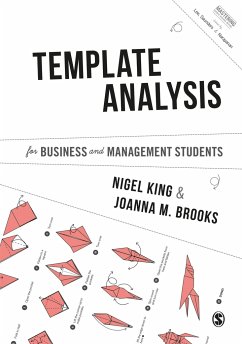In Template Analysis, Nigel King and Joanna Brookes guide you through the origins of template analysis and its place in qualitative research, its basic components, and the main strengths and limitations of this method. Practical case studies and examples from published research then guide you through how to use it in your own research project.
Ideal for Business and Management students reading for a Master s degree, each book in the series may also serve as a reference book for doctoral students and faculty members interested in the method.
Part of SAGE s Mastering Business Research Methods, conceived and edited by Bill Lee, Mark N. K. Saunders and Vadake K. Narayanan and designed to support researchers by providing in-depth and practical guidance on using a chosen method of data collection or analysis.
Ideal for Business and Management students reading for a Master s degree, each book in the series may also serve as a reference book for doctoral students and faculty members interested in the method.
Part of SAGE s Mastering Business Research Methods, conceived and edited by Bill Lee, Mark N. K. Saunders and Vadake K. Narayanan and designed to support researchers by providing in-depth and practical guidance on using a chosen method of data collection or analysis.








